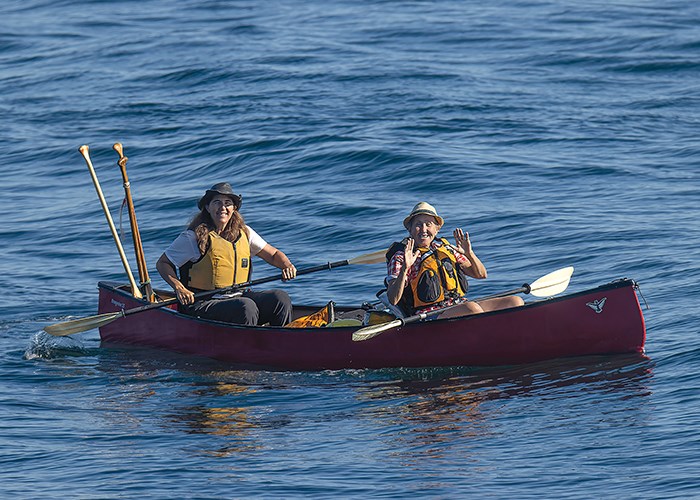There has never been a shortage of helping hands for Dianne Whelan, now on the last leg of her six-year, 27,000 km journey along the Trans Canada Trail. She’s hiked, bicycled, skied, snowshoed and paddled, mostly solo, sometimes with friends, across Canada from east to west, including a trek north to the Arctic. The word “epic” doesn’t quite cover it.
Now, she’s feeling pretty good that she’s at home on the Sunshine Coast – well, almost home. While her friends bustled about on a Roberts Creek beach last Sunday preparing the canoe called Kwimu (loon) for the day’s paddle to Halfmoon Bay, Whelan explains to Coast Reporter that she won’t stop at her Pender Harbour home just yet. She’ll push on across the Strait of Georgia because a filmmaker will be recording that voyage to Victoria, the end of the coast-to-coast journey.
The 56-year-old explorer, writer, photographer, filmmaker and seeker of wisdom has a powerful message for everyone on what she terms her ecological pilgrimage. “Nature is sacred,” she says. Afraid that we have lost something in nature, Whelan went looking for hope and wisdom in the Trail’s woodlands and rivers. She found it. She learned that “the Trail is what connects us – the land and the water.” It’s a metaphor for this vast country.
She learned another life-changing lesson as she was canoeing the huge Bras d’Or Lake in Cape Breton. At first she was blown onto shore and found a shiny red rock on the beach that she took with her for her journey – then the winds changed and swept her out to sea.
“I thought that was it,” she says, recalling her fear in that moment. After finally fighting the wind and waves back to shore and returning the rock to the beach, she realized that exploring was not about taking things; it was about listening and talking with people. There would be five more years of doing exactly that.
When she set out from Newfoundland on July 1, 2015 the province was remembering the World War I deaths of many of the Newfoundland Regiment at Beaumont-Hamel. “My uncle was one of them,” Whelan notes. She wondered who would honour the memory of the murdered and missing Indigenous women, and she vowed to hold them in her thoughts and mark them with ceremony.
“I spent a month along the way with other Indigenous communities,” she says, “with the Mi’kmaq, Ojibwe and Cree, in cross cultural conversation with artists and elders.”
She saw that healing had begun in these communities – a reclamation of language, dance and self-esteem. Slowly, she was developing a hope for a sustainable future based on these conversations: “If we could blend traditional wisdom with science and technology,” she notes, “we would have a sustainable economy.”
Whelan is thankful that there was always someone along the way to offer a bed for the night or a hot meal, but when COVID struck, she found more support than ever. Her partner, Louisa Robinson, supported the journey, living in an off-grid van and helping with logistics and supplies.
Jenica Vaneli, a Gibsons artist, has also joined Whelan four times in the six years. Vaneli recalls a few tough moments – one time she faced down a black bear that had been pawing their tent. On another occasion the biting cold of an Ontario winter froze their canoe in the river forcing them to bushwack to a road.
What now? Whelan is more than ready to write the book. “The stories are writing themselves in my head,” she says. And a film will follow. Friend and filmmaker Ann Verrall along with other artists worked on Beacon Project films.
“Ann came to help for 10 days (initially), and helped me when she could, for four years.” Already three half-hour segments are ready for CBC Gem. Other help came from a Gibsons source in the form of PowHerhouse, a group of women who held a major fundraiser for Whelan and generated $10,000.
“Those women are still cheering me on,” Whelan says.
There are no corporate sponsors for her trip, no chances to sell outdoor equipment – although she has received welcome donations. She wanted it that way. The journey was not about breaking speed records or proving anything – it was about appreciating the land, water and wildlife around her.



